#Assamese Books
Explore tagged Tumblr posts
Text
Assam Book Fair 2024: Guwahati
Assam Book Fair 2024: A Grand Literary Celebration in Guwahati.অসম গ্ৰন্থমেলা ২০২৪ The Assam Book Fair 2024 is back in Guwahati, promising an enriching experience for book lovers, writers, and literary enthusiasts. Organized by the Publication Board Assam in collaboration with the All Assam Publishers and Book Sellers Association, this annual fair is a hub for readers and intellectuals from…
#Art of Reading Good Books#Assam Book Fair#Assamese Books#Best Books Review for 2024#Great Events of Assam#Guwahati City Guide#Guwahati Site Seen#List of Best Books for Job Interview
0 notes
Text
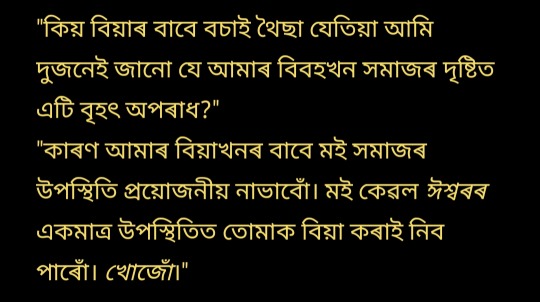
My fav BenuChand quote
6 notes
·
View notes
Text
I'm gonna translate my KSA book to Assamese (my mother tongue) so that the elderly, the Boomers and the Gen Xers I know can read that shit and blow their heads off when they find out it's a romantic journey of two boys HAHA.
They better buckle the fuck up.
#I mean KSA is set in 16th century Assam itself so it makes sense yk#But for that I need a non-homophobic translator#Yes I need a translator cuz I'm not much of a pro in case of Assamese literature#Someone find me a non-homophobic translator lol#also sorry for shitposting so much haha this is so unlike me#wip#writeblr#writerblr#oc wip#writing wip#book wip#writers on tumblr#writing community#shitpost#desiposting#assamese
9 notes
·
View notes
Text
BOOK #2
Name: Makam (মাকাম)
Author: Rita Chowdhury (ৰীতা চৌধুৰী)
Genre: historical fiction/ficton
Language: Assamese
Trigger warnings: mention of death, slavery, violence
Summary: Makam, which means “golden horse” in Cantonese, is a fictionalized historical account of the Chinese Assamese people in North-East India. The novel, by award-winning writer Rita Chowdhury, documents the struggles, suffering, and tragedies of the Chinese Assamese over the past two centuries, culminating in their wrongful expulsion from India during the 1962 Sino-Indian War.Based on interviews with more than one hundred Chinese Assamese, Chowdhury’s moving narrative blends nineteenth century history with the tragedy of 1962, revealing how the Chinese were brought to India decades earlier by the British in order to work as laborers on the tea plantations. Once there, the Chinese married into different communities and began to speak with a mix of their native and local languages. However, during the Sino-Indian war, the Chinese Assamese, though now completely assimilated, were brutally and unjustly forced to leave India because of their Chinese origin. Around fifteen hundred Chinese Assamese from Makum, a small town in upper Assam, were imprisoned as spies and prisoners of war, before being deported to China. The untold story of this terrible incident, captured here in Makam, created an uproar in India when first published.
(source: Goodreads)
Picture for reference:


(cr: amazon)
Where to buy:
Hardcopy: Can be found in your local bookstores and/or online stores like Amazon/ Flipkart.
E-book: Amazon/ Flipkart and/ or other sites.
Personal Opinion:
An amazing book by Rita Chowdhury. No doubt, she's one of my favourite authors. The book is worth is, trust me. The book is divided into two parts, first half if all about the past, and the second part is about the present. The way it all blends in will leave you awestruck. Although the first few pages will leave you a little confused, it's worth it. After you go through about the first 100 pages, it all starts to link in and you won't be able to put the book down without finishing it.
--x--
::Alternative::
Although the book is in Assamese, if you're not someone who understands Assamese but yet you want to read the book, there is an English translation of the book too.
Name: Chinatown Days
--x--
The translation, in my opinion, is good.
Picture for reference:

(cr: Amazon)
Where to buy:
Just like the Assamese version, the English translation is also found both in paperback and e-book version. You can find both online. The paperback is mainly available in Amazon/ Flipkart.
-----.-----
#booklr#book tumblr#books#books and reading#book reccs#book recommendations#makam#RitaChowdhury#assamese#Assamesebooks
4 notes
·
View notes
Text
CBSE Notes
Click on the link below for CBSE Notes: A) Social Notes & MCQ B) Handwritten Notes C) XI/XII Physics CBSE Notes D) X1/XII Biology CBSE Notes
#10#10 cgpa#11#12#about education#accountancy tuition classes#accounts tuition classes#admission#advantages and disadvantages of online classes#advantages of online classes#alternative education#american education#army school tezpur#article about education#articles on education#assam#assamese tuition classes#bachelor of education#best cbse study site#best coaching class in tezpur#best coaching classes tezpur#best online learning#best online tutoring#best tuition classes in tezpur#biology notes#biology tutors#board of education#book#campion a1 classes online#campion a1 notes
0 notes
Text
Under the Bakul Tree by Mrinal Kalita - coming-of-age YA fiction
Under the Bakul Tree is a poignant, touching, and heartfelt coming-of-age YA fiction, a beautiful tale of friendship and hope. Under the Bakul Tree SynopsisReviewBook Links Under the Bakul Tree by Mrinal Kalita, Partha Pratim Goswami (translator) Publication Date : February 12, 2024 Publisher : Penguin Read Date : June 30, 2024 Genre : Fiction / Translated fiction Pages : 301 Source :…
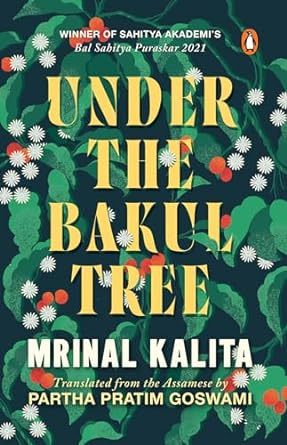
View On WordPress
#Assamese literature#Assamese rural life#Book Blog#book blog feature#Book blogger#Book review#book review blog#Book review feature#book reviewer#Books Teacup and Reviews#Coming of age#Indian Book Blogger#Indian Fiction#Literary Fiction#Partha Pratim Goswami#Penguin books#Penguinster#Translated fiction#Under The Bakul Tree#Under the Bakul Tree by Mrinal Kalita#YA fiction
0 notes
Text

عن أبي موسى الأشعري رضي الله عنه: عن النبيِّ صلَّى اللهُ عليه وسلَّم : أنه كان يدعو بهذا الدعاءِ : “ربِّ اغفِرْ لي خطيئتي وجهلي، وإسرافي في أمري كلِّه، وما أنت أعلَمُ به مني . اللهم اغفِرْ لي خطاياي، وعمدي وجهلي وهَزلي، وكلُّ ذلك عِندي . اللهم اغفِرْ لي ما قدَّمْتُ وما أخَّرْتُ، وما أسرَرْتُ وما أعلَنْتُ، أنت المقدِّمُ وأنت المؤخِّرُ، وأنت على كلِّ شيءٍ قديرٌ” . صحيح البخاري ومسلم حديث ٣٦٩٨-٢٧١٩
Narrated Abu Musa: The Prophet (peace be upon him) used to invoke Allah with the following invocation: ‘Rabbi-ghfir-li Khati 'ati wa jahli wa israfi fi `Amri kullihi, wa ma anta a'lamu bihi minni. Allahumma ighfirli khatayaya wa 'amdi, wa jahli wa jiddi, wa kullu dhalika'indi. Allahumma ighrifli ma qaddamtu wa ma akhartu wa ma asrartu wa ma a'lantu. Anta-l-muqaddimu wa anta-l-mu'akh-khiru, wa anta 'ala kulli shai'in qadir.’ Sahih al-Bukhari 6398 In-book reference : Book 80, Hadith 93 Sahih Muslim 2719 a In-book reference: Book 48, Hadith 94
…وهذا الدعاء والاستغفار من النبي صلى الله عليه وسلم هو على سبيل الافتقار والعبودية لربه عز وجل، والتعليم لأمته، وأن أحداً من العباد لا يكون في غنى عن ربه وعن عفوه ورحمته ومغفرته، بل حاجة العباد إلى مغفرته ورحمته وعفوه، كحاجتهم إلى حفظه وكلاءته ورزقه؛ فإن لم يحفظهم هلكوا، وإن لم يرزقهم هلكوا، وإن لم يغفر لهم ويرحمهم هلكوا وخسروا، ولهذا قال أبوهم آدم وأمهم حواء عليهما السلام: {رَبَّنَا ظَلَمْنَا أَنْفُسَنَا وَإِنْ لَمْ تَغْفِرْ لَنَا وَتَرْحَمْنَا لَنَكُونَنَّ مِنَ الْخَاسِرِينَ}[الأعراف: 23] ، وهذا شأن ولدهما من بعدهما .
قال ابن القيم رحمه الله: «والدعاءَ عبوديةٌ لله وافتقارٌ إليه وتذلُّلٌ بين يديه، فكلَّما كثَّره العبدُ وطوَّله وأعاده وأبداه ونوَّع جُملَه كان ذلك أبلغَ في عبوديته وإظهار فقره وتذلُّـلِه وحاجته، وكان ذلك أقربَ له من ربِّه وأعظمَ لثوابه، وهذا بخلاف المخلوق، فإنَّك كلَّما كثَّرت سؤاله وكررت حوائجك إليه أبرمته وثقَّلت عليه وهِنتَ عليه، وكلما تركتَ سؤاله كان أعظمَ عنده وأحبَّ إليه، والله سبحانه كلَّما سألتَه كنتَ أقربَ إليه وأحبَّ إليه، وكلَّما أَلْححتَ عليه في الدعاء أحبَّكَ، ومَن لَم يسأل الله يغضب عليه. فالله يغضب إن تركتَ سؤاله وبُنَيُّ آدم حين يُسألُ يغضبُ »….. كامل الشرح في الملف المرفق للشيخ البدر
The following is among the comprehensive supplications of the Prophet (may Allah's peace and blessings be upon him): "O Lord, forgive me my sin" and my misdeed, and "my ignorant sins" and what I committed unknowingly. "My excess in all of my affairs", my negligence, and my transgression. "And whatever You are better aware of than me," You know it, O Allah, whereas I forgot it. "O Allah, forgive me my sins, my deliberate sins," and the sins I committed deliberately and knowingly. "My seriousness, my humor," and what was done by way of joking and what I committed in both cases. "And all this I have committed," as it collected the mentioned sins and defects. "O Allah, forgive what I have done" in the past "and what I have left undone" in the future. "What I have committed secretly" and stealthily, "and what I have committed openly" and publicly. "You are the Advancer and You are the Delayer." You make whomever You will of Your creation proceed to Your mercy through Your guidance to what pleases You, and You delay whomever You will from this through forsaking him. None can bring forward what You have delayed, and none can delay what You have put forward. "And You have absolute power over everything", possessing the absolute ability and the perfect will, You do whatever You will. Hadith Translation/ Explanation : English Urdu Spanish Indonesian Uighur Bengali French Turkish Russian Bosnian Sinhalese Indian Chinese Persian Vietnamese Tagalog Kurdish Hausa Portuguese Malayalam Telugu Swahili Tamil Thai German Pashto Assamese Swedish Amharic Dutch Gujarati Kyrgyz Nepali Romanian Hungarian الموري Oromo Georgian: https://hadeethenc.com/en/browse/hadith/5483
#حديث#أحاديث نبوية#دعاء#الرسول صلى الله عليه وسلم#صلى الله عليه وسلم#رسول الله صلى الله عليه وسلم#محمد صلى الله عليه وسلم#النبي صلى الله عليه وسلم#ادعيه اذكار تسبيح دعاء استغفار ايه صلاة صيام#dua دعاء#دعاء اليوم#رب اغفر لي#استغفار#استغفر الله#ادعية#hadith#sunnah#islam#ahadeth#hadeth#muslim#hadith sahih#duaa#prophet muhammad#prophet muhammed pbuh#supplements#forgiveness#ramadan#رمضان
38 notes
·
View notes
Text
Panchala in Mahabharata - Part 4
This is a selective summary of Dr. N. P. Bhaduri's 'Katha Amrita Saman' series, covering only the points that he made with regards to Panchala. Now, because Shikhandi is an integral point to that story, and the professor does note some controversial streams of explanation in relation with his story, I just want to make it clear, that this is just a summary of his work. I personally both agree and disagree with the different parts of his commentary.
Special thanks to @chahaa-piun-ja, who wanted to read the books, and gave me the chance to comb through it once again! ❤️
Parts: 1 2 3 4 5 6 7
In contrast with most form-specific adjectives the writers normally subject these women to, Draupadi is introduced to the Pandavas as ‘darshaneeya anavadyaangi sukumari manaswini’: where her intelligence takes the forefront before whetever her physical qualities may be.
Vyasa mentions that Drupada, from that first day in battle, has always wanted to have Arjuna as a close relative, and after having Draupadi, he is dead-set on finding the lost princes and marrying her to Arjuna.
Among other things, the author mentions that the fish-eye target which is usually used to illustrate the swayamvara challenge, is not mentioned in MB-proper, which rather explains it just as a ‘moving target’, with a small point to serve as the main target. Atitya lakshyam yo vedhha sa labdhva mat-suta-miti (it’s a reach, but mat-suta somehow got misinterpreted as Matsya? Seems unlikely though). Also, one had to hit the target with all five arrows to succeed.
Drupada’s first act of revenge is to be to alienate his best and favourite student.
Draupadi was carrying the weight of Drupada’s silent desire for having Arjuna as his son-in-law, which became part of the reason for her rejection of Karna.
Description of Panchala: in the center of the city, there was the sabha-mandapa, around it, his residence-palace. Outside the palace, a high wall, and outside that a watered moat. At regular intervals, there were gates with intricate toranas. Throughout the inside of the walls, specially for the swayamvara, chandraatapas (or semi-transparent tarps/covers). For announcements, big drums were situated at regular intervals. All roads were washed with sandal-infused water. Several seven-storied buildings were constructed (called vimanas), with gold chandeliers, gem-encrusted seats, and non-steep staircases. For 16 days they had a festival, with several kings and princes congregating. From Panchala’s side, dancers and singers were hired for non-stop entertainment. The Kings, along with Drupada, were engaged in many acts of charity as well.
After Arjuna is successful, Draupadi is described as almost ‘drunk’ with silent excitement. In Kashiram Das’s MB, Arjuna reciprocates this when he fights the other kings and keeps turning back mid-draws to see with a wide grin if Draupadi is impressed enough or if he needs to up his game. 😊
After Dhrishtadyumna check s up on Draupadi and returns, Drupada prepares a roomful of gifts: fruits & flowers, weapons, armour, and agricultural paraphernalia. Once their identities are well-discussed, Drupada makes Draupadi move into the same quarters, even before marriage, as the Pandavas and Kunti.
Then, there’s an interesting bit about ‘bhojana’ being an expression of an intricate relationship (and I do not mean actual food) in Mahabharata in general. Aamis, the Assamese film broadly explores the extremities of this concept in a modern construct.
The brothers then get married to Draupadi over a 5-day span, one after another in order of age. Also, after marriage, for quite some time the Pandavas quietly relax in Kaampilya, with Draupadi before Bheeshma comes up with the plan to divide the kingdom.
By this time, even Drona has become an important minister in Dhritarashtra’s court, but he does not poke and prod at his personal issues with Drupada, and aligns with his technical employer Bheeshma on the division proposal.
10 notes
·
View notes
Text
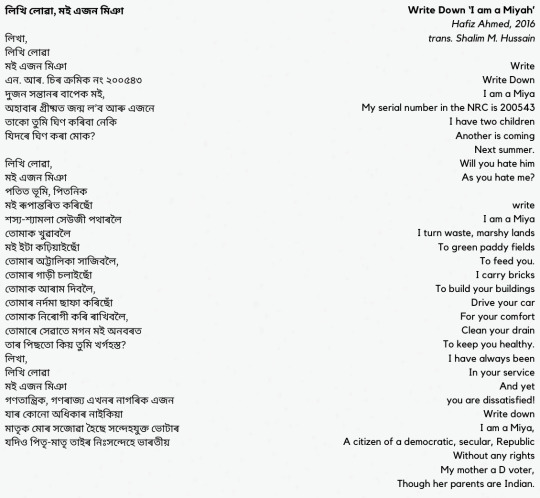

লিখি লোৱা, মই এজন মিঞা ("Write Down 'I am a Miyah'", 2016) by Hafiz Ahmed, translated from Assamese to English by Shalim M. Hussain, began a movement of resistance poetry among Assamese Muslims of Bengali descent, referred to as Miya Poetry after a slur used to describe this community. From Abdul Kalam Azad, for Indian Express ("Write...I am a Miya", 2019):
This poem went viral and other young poets started responding to him through poems. The young poets also started reclaiming “Miya”, a slur used against us, as our identity with pride. This chain of Facebook posts continued for days, reiterating the violence, suffering and humiliation expressed by our community. As time passed, more poets wrote in various languages and dialects, including many Miya dialects. The nomenclature ‘Miya Poetry’ got generated organically but the poets and their associates have been inspired by the Negritude and Black Arts movements, and queer, feminist and Dalit literary movements, where the oppressed have reclaimed the identity which was used to dehumanise them. The trend transcended our community. Poets from the mainstream Assamese community also wrote several poems in solidarity with the Miya poets while some regretted not being poets. Gradually, this became a full-fledged poetry movement and got recognised by other poets, critics and commentators. The quality and soul of these poems are so universal that they started finding prominence on reputed platforms. For the first time in the history of our community, we had started telling our own stories and reclaiming the Miya identity to fight against our harassers who were dehumanising us with the same word. They accused us of portraying the whole Assamese society as xenophobic. The fact is we have just analysed our conditions. Forget generalising the Assamese society as ‘xenophobic’, no Miya poet has ever used the term ‘xenophobic’ nor any of its variants. The guilt complex of our accusers is so profound that they don’t have the patience to examine why we wrote the poems.
Amrita Singh, writing for The Caravan ("Assam Against Itself", 2019), detailed the political backlash against Miya Poetry, in particular the above poem.
On 10 July this year, Pranabjit Doloi, an Assam-based journalist, filed a complaint at Guwahati’s Panbazar police station accusing ten people of indulging in criminal activities “to defame the Assamese people as Xenophobic in the world.” Doloi claimed that the ten people were trying to hinder the ongoing updation of the National Register of Citizens, a list of Assam’s Indian citizens that is due to be published on 31 August. The premise of Doloi’s complaint was a widely-circulated poem called, “Write down I am Miya,” by Hafiz Ahmed, a school teacher and social activist. “Write. Write down I am a Miya/ A citizen of democratic secular republic without any rights,” Ahmed wrote. The police registered a first information report against Doloi’s complaint, booking all ten persons for promoting enmity between groups, among other offences. [...] At the press conference, Mander emphasised that people in Assam are in distress because of the NRC’s arbitrary and rigid procedures. “One spelling mistake when you are writing a Bengali name in English … that is enough for you to be in a detention center, declared a foreigner,” Mander said. “If you are not allowing this lament to come out in the form of poetry, then where is this republic of India going?”
Ahmed's poem is influenced in structure by "Identity Card", a 1964 poem by by Palestinian poet Mahmoud Darwish which uses the symbolic figure of the Palestinian working man to confront Israeli occupiers. Darwish's identity card, a symbol of Israeli subjugation transformed into a cry of Palestinian national identity, is reshaped by Ahmed into the National Register of Citizens for Assam and the accompanying fear of statelessness and disenfranchisement for the Miya people.
This solidarity between writers from oppressed groups is, of course, not one that ends with Darwish and Ahmed, nor with the Black, queer, feminist, and Dalit influences of Miya Poetry. As long as there is oppression, there will be companionship and recognition reflected in art and activism. On December 13, 2023, Black Agenda Report reprinted Refaat Alareer's "If I Must Die", acknowledging the connection between Alareer's poem and "If We Must Die" by Claude McKay, written in 1919 in response to the Red Summer white supremacist riots. In 2000, Haitian community activist Dahoud Andre translated "If We Must Die" into Kreyòl, and the Black Agenda Report editorial honors Alareer in a similar way, reprinting "If I Must Die" with an accompanying Kreyòl translation. (POEM: If I Must Die, Refaat Alareer, 2023.)
Transcripts under the cut.
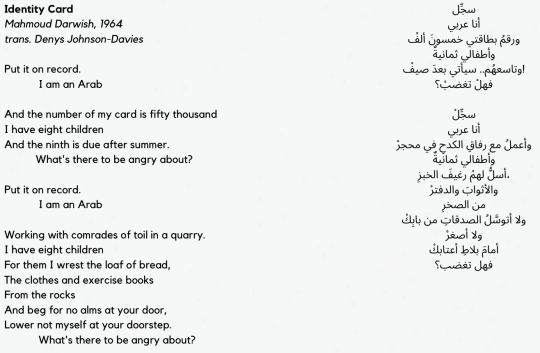

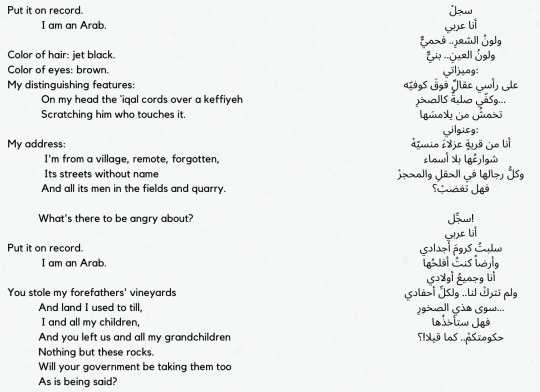

[Hafiz Ahmed Transcripts (Assamese and English):
লিখি লোৱা, মই এজন মিঞা
লিখা, লিখি লোৱা মই এজন মিঞা এন. আৰ. চিৰ ক্রমিক নং ২০০৫৪৩ দুজন সন্তানৰ বাপেক মই, অহাবাৰ গ্ৰীষ্মত জন্ম ল’ব আৰু এজনে তাকো তুমি ঘিণ কৰিবা নেকি যিদৰে ঘিণ কৰা মোক?
লিখি লোৱা, মই এজন মিঞা পতিত ভূমি, পিতনিক মই ৰূপান্তৰিত কৰিছোঁ শস্য-শ্যামলা সেউজী পথাৰলৈ তোমাক খুৱাবলৈ মই ইটা কঢ়িয়াইছোঁ তোমাৰ অট্টালিকা সাজিবলৈ, তোমাৰ গাড়ী চলাইছোঁ তোমাক আৰাম দিবলৈ, তোমাৰ নৰ্দমা ছাফা কৰিছোঁ তোমাক নিৰোগী কৰি ৰাখিবলৈ, তোমাৰে সেৱাতে মগন মই অনবৰত তাৰ পিছতো কিয় তুমি খৰ্গহস্ত? লিখা, লিখি লোৱা মই এজন মিঞা গণতান্ত্ৰিক, গণৰাজ্য এখনৰ নাগৰিক এজন যাৰ কোনো অধিকাৰ নাইকিয়া মাতৃক মোৰ সজোৱা হৈছে সন্দেহযুক্ত ভোটাৰ যদিও পিতৃ-মাতৃ তাইৰ নিঃসন্দেহে ভাৰতীয়
ইচ্ছা কৰিলেই তুমি মোক হত্যা কৰিব পাৰা, জ্বলাই দিব পৰা মোৰ খেৰৰ পঁজা, খেদি দিব পাৰা মোক মোৰেই গাঁৱৰ পৰা, কাঢ়ি নিব পাৰা মোৰ সেউজী পথাৰ মোৰ বুকুৰ ওপৰেৰে চলাব পাৰা তোমাৰ বুলড্জাৰ তোমাৰ বুলেটে বুকুখন মোৰ কৰিব পাৰে থকাসৰকা (তোমাৰ এই কাৰ্যৰ বাবে তুমি কোনো স্তিও নোপোৱা) যুগ-যুগান্তৰ তোমাৰ অত্যাচাৰ সহ্য কৰি ব্ৰহ্মপুত্ৰৰ চৰত বাস কৰা মই এজন মিঞা মোৰ দেহা হৈ পৰিছে নিগ্ৰো কলা মোৰ চকুযুৰি অঙঠাৰ দৰে ৰঙা সাৱধান! মোৰ দুচকুত জমা হৈ আছে যুগ যুগান্তৰৰ বঞ্চনাৰ বাৰুদ আঁতৰি যোৱা, নতুবা অচিৰেই পৰিণত হ’বা মূল্যহীন ছাইত!
Write Down ‘I am a Miyah’ Hafiz Ahmed, 2016 trans. Shalim M. Hussain
Write Write Down I am a Miya My serial number in the NRC is 200543 I have two children Another is coming Next summer. Will you hate him As you hate me?
write I am a Miya I turn waste, marshy lands To green paddy fields To feed you. I carry bricks To build your buildings Drive your car For your comfort Clean your drain To keep you healthy. I have always been In your service And yet you are dissatisfied! Write down I am a Miya, A citizen of a democratic, secular, Republic Without any rights My mother a D voter, Though her parents are Indian.
If you wish kill me, drive me from my village, Snatch my green fields hire bulldozers To roll over me. Your bullets Can shatter my breast for no crime.
Write I am a Miya Of the Brahamaputra Your torture Has burnt my body black Reddened my eyes with fire. Beware! I have nothing but anger in stock. Keep away! Or Turn to Ashes.
]
[Mahmoud Darwish Transcripts (Arabic and English):
سجِّل أنا عربي ورقمُ بطاقتي خمسونَ ألفْ وأطفالي ثمانيةٌ وتاسعهُم.. سيأتي بعدَ صيفْ! فهلْ تغضبْ؟ سجِّلْ أنا عربي وأعملُ مع رفاقِ الكدحِ في محجرْ وأطفالي ثمانيةٌ أسلُّ لهمْ رغيفَ الخبزِ، والأثوابَ والدفترْ من الصخرِ ولا أتوسَّلُ الصدقاتِ من بابِكْ ولا أصغرْ أمامَ بلاطِ أعتابكْ فهل تغضب؟ سجل أنا عربي أنا اسم بلا لقبِ صَبورٌ في بلادٍ كلُّ ما فيها يعيشُ بفَوْرةِ الغضبِ جذوري قبلَ ميلادِ الزمانِ رستْ وقبلَ تفتّحِ الحقبِ وقبلَ السّروِ والزيتونِ .. وقبلَ ترعرعِ العشبِ أبي.. من أسرةِ المحراثِ لا من سادةٍ نُجُبِ وجدّي كانَ فلاحاً بلا حسبٍ.. ولا نسبِ! يُعَلّمني شموخَ الشمسِ قبلَ قراءةِ الكتبِ وبيتي’ كوخُ ناطورٍ منَ الأعوادِ والقصبِ فهل تُرضيكَ منزلتي؟ أنا اسم بلا لقبِ! سجلْ أنا عربي ولونُ الشعرِ.. فحميٌّ ولونُ العينِ.. بنيٌّ وميزاتي: على رأسي عقالٌ فوقَ كوفيّه وكفّي صلبةٌ كالصخرِ... تخمشُ من يلامسَها وعنواني: أنا من قريةٍ عزلاءَ منسيّهْ شوارعُها بلا أسماء وكلُّ رجالها في الحقلِ والمحجرْ فهل تغضبْ؟ سجِّل! أنا عربي سلبتُ كرومَ أجدادي وأرضاً كنتُ أفلحُها أنا وجميعُ أولادي ولم تتركْ لنا.. ولكلِّ أحفادي سوى هذي الصخورِ... فهل ستأخذُها حكومتكمْ.. كما قيلا!؟ إذنْ سجِّل.. برأسِ الصفحةِ الأولى أنا لا أكرهُ الناسَ ولا أسطو على أحدٍ ولكنّي.. إذا ما جعتُ آكلُ لحمَ مغتصبي حذارِ.. حذارِ.. من جوعي ومن غضبي!!
Identity Card Mahmoud Darwish, 1964 trans. Denys Johnson-Davies
Put it on record. I am an Arab
And the number of my card is fifty thousand I have eight children And the ninth is due after summer. What's there to be angry about?
Put it on record. I am an Arab
Working with comrades of toil in a quarry. I have eight children For them I wrest the loaf of bread, The clothes and exercise books From the rocks And beg for no alms at your door, Lower not myself at your doorstep. What's there to be angry about?
Put it on record. I am an Arab.
I am a name without a title, Patient in a country where everything Lives in a whirlpool of anger. My roots Took hold before the birth of time Before the burgeoning of the ages, Before cypress and olive trees, Before the proliferation of weeds.
My father is from the family of the plough Not from highborn nobles.
And my grandfather was a peasant Without line or genealogy.
My house is a watchman's hut Made of sticks and reeds.
Does my status satisfy you? I am a name without a surname.
Put it on record. I am an Arab.
Color of hair: jet black. Color of eyes: brown. My distinguishing features: On my head the `iqal cords over a keffiyeh Scratching him who touches it.
My address: I'm from a village, remote, forgotten, Its streets without name And all its men in the fields and quarry. What's there to be angry about?
Put it on record. I am an Arab.
You stole my forefathers' vineyards And land I used to till, I and all my children, And you left us and all my grandchildren Nothing but these rocks. Will your government be taking them too As is being said?
So! Put it on record at the top of page one: I don't hate people, I trespass on no one's property.
And yet, if I were to become hungry I shall eat the flesh of my usurper. Beware, beware of my hunger And of my anger!
]
#it speaks!#re: the tag on my last reblogged post. decided to make that point its own post!#this is long obviously and im employing proper capitalization for ease of reading#obligatory im monolingual disclaimer & cant vouch for translation quality; i chose the johnson-davies translation because ->#<- it is the one i see most commonly spread. i take responsibility for any deficiencies.#going to use some tags because im personally interested in this poetic movement & connection & maybe other people will be too!#palestine#palestinian poetry#assam#miya poetry#political poetry#poetry#in translation
67 notes
·
View notes
Note
Hi! I wanted to ask you about where/how do your research for clothing? I really love the way you draw clothing in general, but the clothing itself is also like super cool to me‼️‼️ Im asking because you mentioned Pala dynasty clothing recently, and I’d actually never heard of it before and I’d love to learn more about it and other types of clothing‼️But just googling tends to be unhelpful.
Good question! Yet, I have a very scattered half hazard way of gathering information haha
For example, I needed to research the clothing of ancient Assam, India for a comic I wanted to make of the Camel Ridge brothers. Hold your gasps, but I usually go to Wikipedia. Yeah yeah you can laugh at me later.
I narrow down the specific kingdom, dynasty, village, people, whatever I can find through the links throughout the site. Then, when I’ve pinpointed exactly the location, tribe, whatever is in the specific area the comic is set in, I scroll down to the resources used in the article and go to those to read more. If I’m lucky, there’s even entire books I can read to help my research!
It’s also helpful to go straight to people you can talk to who can help you look for more sources, my friends sent me a whole article on the diffrent clothing of Assamese people and I nearly cried in relief

102 notes
·
View notes
Text
Assam Sahitya Sabha 2025 Session Pathsala
Assam Sahitya Sabha 2025 Session Pathsala.অসম সাহিত্য সভা ২০২৫ পাঠশালা অধিবেশন. The Assam Sahitya Sabha is the premier literary organization of Assam, dedicated to the promotion and preservation of Assamese literature, language, and culture. Here are the key highlights about the organization: Founding and History Established: Assam Sahitya Sabha was founded on December 27, 1917, in Sivasagar,…
#All About Assam#Assam Sahitya Sabha 2025 Session Pathsala#Assamese Books#Assamese Language Literature#Assamese Poets#Bajali District Information#Cultural Organizations in North Guwahati#Pathsala City Guide
0 notes
Text
Guys if yall wanna see my OCs pls follow
1. @krisnosura for my book (Krisnosura/KSA) OC content, and all the character descriptions are in the pinned post there.
2. @hemogoblin-art especially for C!LAWSverse content
C!LAWS/C-LAWS is an Italian circuspunk band from Milan, Italy, formed in 2021, consisting of four members:
Jasper Alveron: A red fox. Band founder and lead guitarist (OC of @rhys-phyre ). He's Finnish.

Daksh Laskar: A white tiger. Bassist. (my OC) He's Indian(Assamese)-Italian.

Rod Barrels: A ferret. Lead singer and keytarist (OC of @sistema-jerimum ). He's probably Norwegian-Italian.

This was the only pic I had 😭
Bard Bonson: A grizzly bear. And the drummer (OC of another friend of mine). He's probably Scottish-Italian.

We initially came up with the band as a college project and now Im continuing the legacy of its universe because I can
Check the following tags to look up artworks related to this universe:
#C!LAWS
#C!LAWSverse
You'll get another band of mine called The Cocktails, an Australian-Italian band (originally a cover band but now also releases original albums) formed in Rome in 2018, which include four members (all of which are cockatiels):
Coen Sawkins

Benji Smyth (Coen's boyfriend and my pfp)

Wyatt Bates

Willow Mitchell

The band has been sort of dormant since the Covid-19 and is now also part of the production crew of C!LAWS.
9 notes
·
View notes
Text
As they advocate for a free public library system with politicians and policy makers, Free Libraries Network organizers continue to build community libraries on the ground as examples of the world they want. In Dibrugarh, a city of just over 150,000 in the northeast corner of Assam, trans rights activist and storyteller Rituparna Neog established the Chandraprabha Saikiani Feminist Library & Resource Centre as a library and community space. The brightly lit space features walls festooned with rainbow flags and shelves of books for patrons of all ages in a mix of languages including Hindi, English and Assamese. Library leaders also support Project Kitape Katha Koi, a community library that serves children in nearby Chenijan, Jorhat, among the region’s industrial tea plantations. “Within a free community library, we can sit together, we can exercise democratic values, have discussion and conversation, sharing of information, knowledge,” Rituparna told Truthout. “The free community library is a site of resistance.”
Grover sees free libraries in Assam and across India as part of a history of public library organizing in the country. “For the longest time, we have seen waves of library movements and individual and collective efforts to build a public library system in India,” says Grover. “Each time it gains momentum the ideas are filtered down, diluted and eventually buried, perhaps barring in Kerala, till they are unearthed again with a fresh set of demands for public libraries for the people. No matter the number of blows to the movements, the demand keeps resurfacing.”
For now, FLN activists and organizers are leaning into the library as a crucial institution in broader movements for social and political change, especially urgent as the extreme right continues to consolidate state power in the country. “Libraries are the people’s tools to educate, organize and agitate,” says Rao. “FLN recognizes the critical role of the library in listening and responding to the people’s struggles. The library must employ its resources, infrastructure and services to empower all.”
#this article is by emily drabinski who just finished up a term as president of the american library association#public libraries
2 notes
·
View notes
Text
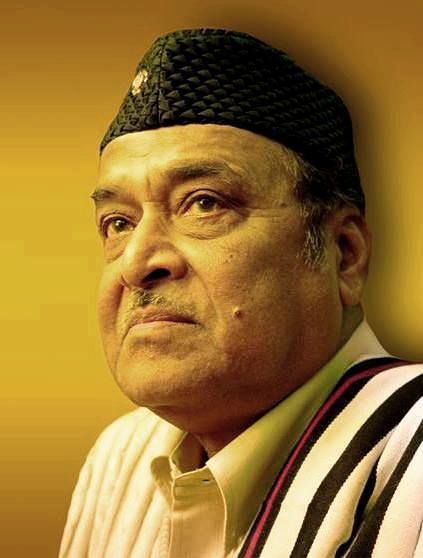
Tributes to Bhupen Hazarika, one of India’s finest film musicians, on his 12th death anniversary (05/11/11). Bhupen Hazarika was a renowned Indian artist from Assam who wore many hats. He was a singer known for his rich baritone voice, a lyricist who wrote meaningful songs, a musician, poet, actor, editor, filmmaker, professor, and even a politician. His songs, mostly in Assamese, are loved for their themes of humanity and brotherhood and have been sung in various languages, including Bengali and Hindi. In West Bengal, Assam, and Bangladesh, his music is celebrated for promoting unity, justice, and empathy. Hazarika brought Assam and Northeast India’s culture and folk music to the broader Indian audience, significantly influencing Hindi cinema. He won many prestigious awards, including the National Film Award for Best Music Direction, the Padma Shri, Padma Bhushan, and after his death, the Padma Vibhushan and Bharat Ratna. He was also Chairman of the Sangeet Natak Akademi. His work included adaptations of American Black Spirituals learned from his friend Paul Robeson. His song “Manush Manusher Jonno” is highly regarded in Bangladesh, and his “Bistirno Parore” reflects influences from Robeson’s “Ol’ Man River.” A documentary film about his life, “Moi Eti Zazabor” (‘I am a Wanderer’), was started in 1986 by directors Waesqurni Bora and Arnab Jan Deka, featuring music by Jim Ankan Deka. Despite production delays, work on the film continues, aiming for release in multiple languages. Two books by co-director Arnab Jan Deka document the film’s journey, with one released at an event organized by Hazarika himself.
2 notes
·
View notes
Text
Assam & Himachal Honeymoon Packages by GoingBo

Plan the Perfect Romantic Escape with GoingBo
Every couple dreams of a memorable honeymoon that captures the essence of their love story. GoingBo helps you turn that dream into reality with well-curated honeymoon packages that offer comfort, adventure, and scenic beauty. Whether it’s the serene tea gardens of Assam or the tranquil mountains of Himachal, our Assam honeymoon packages and Dalhousie Dharamshala honeymoon packages are designed to give you the best start to your new journey together.
With a focus on personalization, comfort, and seamless service, GoingBo ensures your honeymoon is as special and stress-free as it should be.
Why Book Your Honeymoon with GoingBo?
GoingBo is a leading name in personalized travel planning. We understand the importance of your honeymoon and offer carefully crafted packages that focus on:
Romantic accommodations
Handpicked sightseeing options
Local experiences and guided tours
Safe, hassle-free travel arrangements
Transparent pricing with no hidden costs
Our experts take care of everything—from arrival to departure—so you can focus on making beautiful memories together.
Discover the North East: Assam Honeymoon Packages
Assam, a gem in the heart of Northeast India, is a perfect destination for couples seeking a mix of natural beauty, culture, and serenity. With lush tea estates, wildlife sanctuaries, river cruises, and historic sites, GoingBo’s Assam honeymoon packages offer a unique romantic escape unlike any other.
Highlights of Assam Honeymoon Packages
1. Guwahati – The Gateway to Northeast India
Visit the Kamakhya Temple for blessings
Enjoy a romantic cruise on the Brahmaputra River
Explore vibrant markets and local Assamese cuisine
2. Kaziranga National Park
Ideal for couples who love wildlife and nature
Jeep safaris to spot the one-horned rhinoceros
Stay in eco-resorts surrounded by forest landscapes
3. Majuli Island – The Riverine Romance
The world’s largest river island
Known for its monasteries, art, and peaceful settings
Great for couples looking to disconnect and rejuvenate
4. Tea Estates in Jorhat
Stroll through endless tea gardens
Learn about tea production and enjoy fresh brews together
Stay in heritage bungalows with scenic views
With our Assam honeymoon packages, you can expect heritage accommodation, local guided tours, private transfers, and personalized experiences tailored just for you.
Romantic Mountain Retreats: Dalhousie, Dharamshala Honeymoon Packages
Nestled in the scenic Himachal Pradesh hills, Dalhousie and Dharamshala offer a peaceful and romantic atmosphere perfect for honeymooners. GoingBo’s Dalhousie Dharamshala honeymoon packages bring you close to nature, spirituality, and serene mountain beauty.
Highlights of Dalhousie Dharamshala Honeymoon Packages
1. Dalhousie – Colonial Charm & Peace
Visit Khajjiar, often called the ‘Mini Switzerland of India’
Nature walks through pine forests and along quiet trails
Stay in cozy heritage resorts overlooking the valleys
2. Panchpula & Satdhara Falls
Scenic picnic spots and waterfall treks
Ideal for capturing beautiful honeymoon memories
3. Dharamshala – The Spiritual Escape
Visit McLeod Ganj, the seat of the Dalai Lama
Explore monasteries and enjoy breathtaking views of the Dhauladhar range
Experience Tibetan culture and cuisine
4. Triund Trek (Optional)
A short and scenic trek for adventurous couples
Stunning sunset and mountain views
Perfect for adding a touch of thrill to your honeymoon
GoingBo’s Dalhousie Dharamshala honeymoon packages offer well-planned itineraries with private vehicles, comfortable stays, and flexible sightseeing options that match your travel style.
Package Inclusions
Both Assam honeymoon packages and Dalhousie Dharamshala honeymoon packages from GoingBo come with comprehensive features to ensure a smooth and romantic getaway:
Romantic Stays: Handpicked resorts, tea estate bungalows, or mountain lodges
Private Transfers: Comfortable and secure travel between all locations
Local Experiences: Guided tours, cultural visits, nature walks, and more
Custom Add-ons: Candlelight dinners, spa sessions, couple’s photoshoots
24/7 Assistance: On-call support throughout your trip
We focus on delivering quality experiences so that your honeymoon is relaxing, enjoyable, and truly special.
Personalize Your Honeymoon
At GoingBo, we believe that every couple deserves a honeymoon that reflects their personality. That’s why all our packages are customizable. Want to stay an extra night? Prefer a specific hotel? Interested in unique local experiences? We’ll tailor the package to your exact needs.
Our expert team works closely with you to make sure every detail is taken care of, without stress or last-minute changes.
Why Couples Choose GoingBo
Thousands of successful honeymoon bookings
High satisfaction and repeat customer rate
Expertise in offbeat and romantic destinations
Local guides and trusted travel partners
Affordable options for every budget
Start Your Journey of Love with GoingBo
Make your honeymoon an unforgettable experience with GoingBo’s thoughtfully designed Assam honeymoon packages and Dalhousie Dharamshala honeymoon packages. Whether you’re sipping tea in the Northeast or cuddling under the stars in Himachal, we make sure your trip is full of romance, comfort, and beautiful memories.
Visit www.goingbo.com to book your honeymoon package or consult with our experts for a personalized itinerary. Let GoingBo plan your first journey together—perfectly.
0 notes
Text
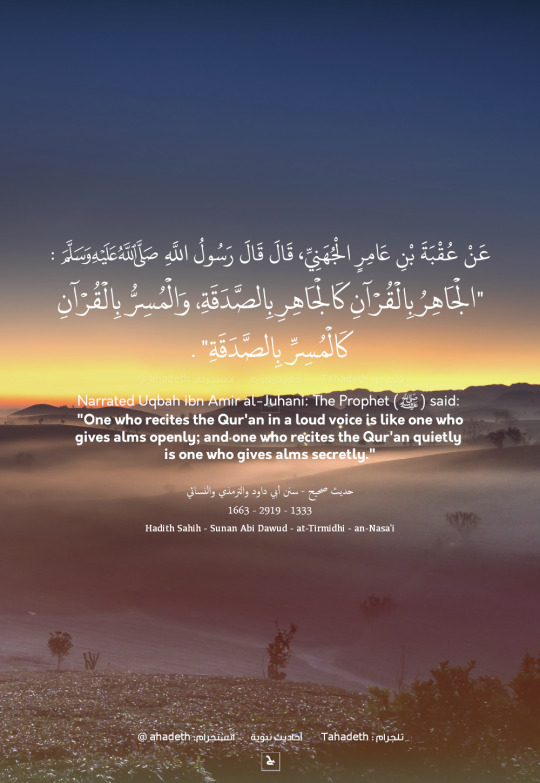
عَنْ عُقْبَةَ بْنِ عَامِرٍ الْجُهَنِيِّ، قَالَ قَالَ رَسُولُ اللَّهِ صلى الله عليه وسلم : " الْجَاهِرُ بِالْقُرْآنِ كَالْجَاهِرِ بِالصَّدَقَةِ، وَالْمُسِرُّ بِالْقُرْآنِ كَالْمُسِرِّ بِالصَّدَقَةِ " . حديث صحيح - سنن أبي داود ١٣٣٣ - والترمذي ٢٩١٩- والنسائي ١٦٦٣
Narrated Uqbah ibn Amir al-Juhani: The Prophet (ﷺ) said: "One who recites the Qur'an in a loud voice is like one who gives alms openly; and one who recites the Qur'an quietly is one who gives alms secretly." Hadith Sahih - Sunan Abi Dawud 1333 In-book reference : Book 5, Hadith 84 | Jami` at-Tirmidhi 2919 In-book reference : Book 45, Hadith 45 | Sunan an-Nasa'i 2561 In-book reference : Book 23, Hadith 127
قال الترمذي: وَمَعْنَى هَذَا الْحَدِيثِ أَنَّ الَّذِي يُسِرُّ بِقِرَاءَةِ الْقُرْآنِ أَفْضَلُ مِنَ الَّذِي يَجْهَرُ بِقِرَاءَةِ الْقُرْآنِ لأَنَّ صَدَقَةَ السِّرِّ أَفْضَلُ عِنْدَ أَهْلِ الْعِلْمِ مِنْ صَدَقَةِ الْعَلاَنِيَةِ وَإِنَّمَا مَعْنَى هَذَا عِنْدَ أَهْلِ الْعِلْمِ لِكَىْ يَأْمَنَ الرَّجُلُ مِنَ الْعُجُبِ لأَنَّ الَّذِي يُسِرُّ الْعَمَلَ لاَ يُخَافُ عَلَيْهِ الْعُجْبُ مَا يُخَافُ عَلَيْهِ مِنْ عَلاَنِيَتِهِ . جامع الترمذي
العِباداتُ كلُّها يَنبَغي أن تَكونَ خالِصةً لوجهِ اللهِ، ولا يُطلَبَ بها الرِّياءُ ولا السُّمعةُ ولا التَّفاخرُ بينَ النَّاسِ؛ لأنَّ اللهَ غنيٌّ عن كلِّ ذلك، وإنَّما يَقبَلُ مِن تلك العباداتِ ما كان خالِصًا لوجهِه سبحانَه. وفي هذا الحديثِ يَقولُ النَّبيُّ صلَّى اللهُ علَيْه وسلَّم: "الجاهرُ بالقرآنِ"، أي: الَّذي يَرفَعُ صوتَه بالقرآنِ في القِراءةِ، وخاصَّة أمامَ النَّاسِ؛ "كالجاهرِ بالصَّدقةِ"، أي: مِثلُ المُجاهِرِ المُعلِنِ لصَدقتِه أمامَ النَّاسِ "والمُسِرُّ بالقرآنِ كالمُسِرِّ بالصَّدقةِ"، أي: مَن يقرَأُ في سِرِّه ويتَدبَّرُ بعَقلِه مِثل الَّذي يُخفِي صَدَقتَه عن أعيُنِ النَّاسِ، والإسرارُ أفضلُ في حَقِّ مَن يَخافُ الرِّياءَ؛ لأنَّ الإسرارَ أبعدُ عن الرِّياءِ؛ فإنْ لم يَخَفْ، فالجهرُ أفضلُ بشَرْط ألَّا يُؤذِي غيرَه ولا يتأذَّى بقِراءتِه أحدٌ كمُصلٍّ أو نائمٍ أو غيرِهما، والعملُ في الجَهرِ أكثرُ، ويَتعدَّى نفْعُه إلى غيرِ القارئِ؛ ويُوقِظُ قلبَ القارِئ، ويَجمَع همَّه إلى الفِكر، ويصرِفُ سمْعَه إليه؛ ويطرُد النومَ، ويزيدُ في النشاط؛ فمتَى حضَره شيءٌ من هذه النِّيات؛ فالجهرُ أفضلُ؛ فإذا كان الجهرُ يترتَّبُ عليه مصلحةٌ، فهذا الجهرِ أوْلَى، وإذا لم يَكُن في الجَهرِ مَصلحةٌ فالإسرارُ أَوْلَى، فهذا أفضلُ مِن هذه الناحيةِ. وقيل: ما كان فيه التدبرُ أتمَّ فهو الأفضلُ. وفي الحديثِ: مدْحُ الإسرارِ بالعِباداتِ معَ إخلاصِها للهِ. وفيه: بيانُ أنَّه لا أجْرَ لِمَن يُرائِي بعِلْمه وقِراءَتِه. الدرر السنية
Reciting the Qur’an secretly is better, just as giving charity secretly is better, for the sincerity involved and the avoidance of show-off and self-admiration, unless if openness is required for some need or benefit, like teaching the Qur’an to others. Hadith Translation/ Explanation : English Urdu Spanish Indonesian Uyghur Bengali French Turkish Bosnian Sinhalese Indian Vietnamese Tagalog Kurdish Hausa Portuguese Malayalam Telgu Swahili Tamil Burmese Thai German Pashto Assamese Albanian Swedish Amharic Dutch Gujarati Kyrgyz Nepali Yoruba Lithuanian Dari Serbian Somali Tajik Kinyarwanda Romanian Hungarian Czech Malagasy Italian Oromo Kannada Azeri Uzbek Ukrainian: https://hadeethenc.com/en/browse/hadith/65055
#حديث#أحاديث نبوية#الرسول صلى الله عليه وسلم#رسول الله صلى الله عليه وسلم#صلى الله عليه وسلم#النبي محمد صلى الله عليه و آله وسلم#محمد صلى الله عليه وسلم#اللهم صل وسلم على نبينا محمد#تلاوة#قيام الليل#القرآن الكريم#قراءة القرآن#تدبر القرآن#تلاوة القرآن#سر#جهر#الصدقة#صدقة#hadith#ahadeth#hadeth#hadith sahih#sunnah#islam#muslim#prophet muhammad#sunna#hadiths#quran#quran recitation
41 notes
·
View notes